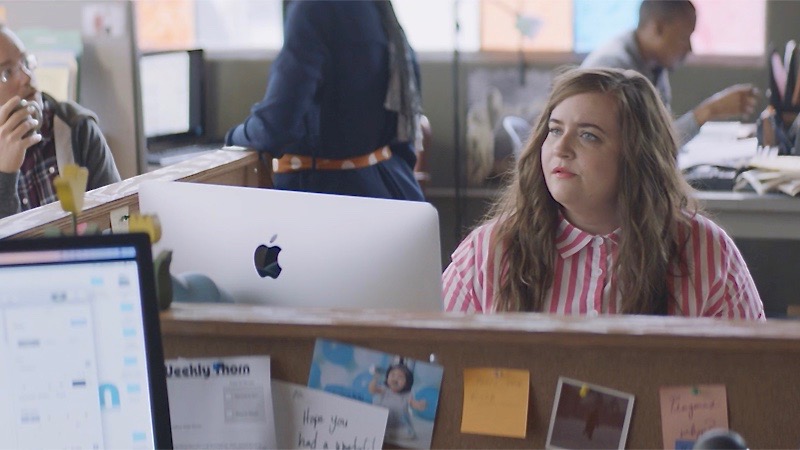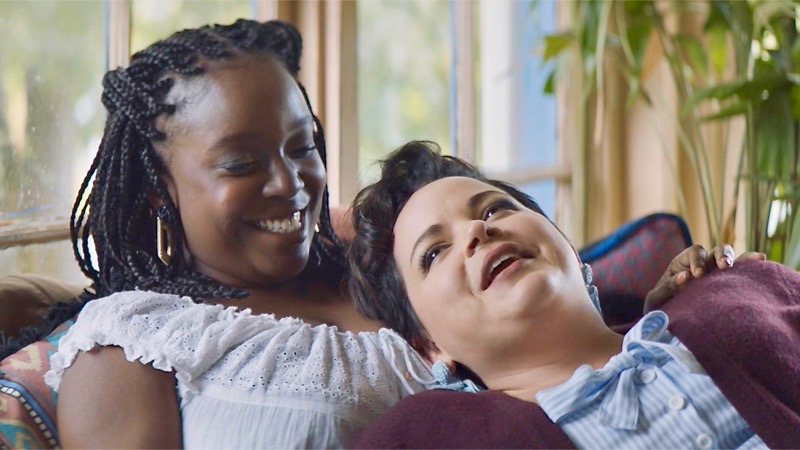
Shrill Celebrates Body Positivity; If Only It Celebrated Its Black Lesbian Character, Too
Aidy Bryant’s new series, Shrill, based on Lindy West’s memoir of the same name, landed on Hulu last week to much acclaim for casting a fat actress, tackling cultural and political issues around fatness, or even just using the word “fat.” I really, really wanted to like it because we need fat babe representation, and while I found some things about the series enjoyable — the pool party! the abortion storyline! Aidy Bryant herself! — the pacing, racist tropes and general “Who lives like this?” vibe left me frustrated.

Shrill kicks off with an episode aptly named “Annie,” where we meet Aidy Bryant’s Annie, an emerging writer who is young, pretty and fat. From go, the writers drive home that her fatness is central to the plot via having Annie eat diet meals and grimacing, trying to stretch her clothes to fit better and having a super thin aerobic instructor force shitty fatphobic advice on her. Her mom concern trolls her when she complains that the diet meal plan they’re both on isn’t good. Her boss posts a series of articles condemning fat people as America’s biggest problem. The rapid and intense flagging of her fatness and unhappiness don’t leave room for much else in those first 22 minutes, which is a disservice to the character and the audience. What could have been a build up of small and large indignities is instead portrayed as a never ending avalanche and that’s all we get to know about Annie, other than the fact that she wants to write.
Actually, we also learn she has no self-esteem and is sleeping with the worst man ever, Ryan. Ryan, who makes her sneak out the back door of his house. And yet Annie defends him! She also, horrendously, lets him “raw dog” her — as in, they have sex without a condom — because it’s “his favorite thing.” Instead of getting on birth control, or you know, not having unprotected sex like fully grown and responsible adult woman, she just gets the morning after pill every time.
Surprisingly, the first solidly progressive moments of the show take place as a result of these choices. Annie ends up pregnant and goes to the pharmacy to inquire how that’s possible if she took the morning-after pill. The pharmacist informs her that if you are over 175lbs the pill won’t work. This is a really important and little known fact that was really refreshing to see on screen. But now Annie has to wrestle with what to do and we finally see some real vulnerability in her as she explains she just wanted Ryan to like her and was afraid he’d dump her if she didn’t have unprotected sex. It’s a great moment; we don’t often talk about the ways in which fat women are made to feel that they should cling to any scrap of affection.
Shortly after, Annie admits she’s considering keeping the baby because it might be her only chance to become a mom, her best friend Fran has a come to Jesus moment with her. Fran breaks down why Annie is worth more than the shitty way she lets herself be treated. This pep talk, mixed with a relentlessly humiliating run-in with Ryan, makes Annie take stock of what she wants to do with her life and her pregnancy. In the end, Annie chooses to have an abortion. We don’t just see her in the aftermath. We see her in the waiting room. We see her ask Fran come in with her. We witness the doctor explaining exactly what’s happening during the procedure. It’s a serious TV moment.
Another progressive and transformative moment is the Body Posi pool party Annie attends in episode four. It’s a pool party for all body types to come out and drink, dance, and swim without stares and judgment. (In real life, both Portland and LA host parties like this on a regular basis.) It’s at this party that we see our first wheelchair user and we get to meet Fran’s future love interest, Vic. At first, Annie is too self-conscious to participate, refusing to dance and remaining fully dressed. After she finally loosens up and mingles with the other ladies, we get one of the coolest scenes I think I’ve seen when it comes to fat bodies in motion. Annie decides to finally take a dip into the pool and we watch her swim smoothly underneath the partygoers. She has a solid form and we can see her thighs ripple with her movement. It’s a beautifully shot sequence that shows what active fat bodies look like – strong, free, capable and still fat. It’s glorious and should be shown to teenage girls across the world.

I’ve already mentioned Fran, but let me fully introduce her. Fran is Annie’s Sassy Black Friend. She’s British. She also happens to be a lesbian. That’s really… about it. She calls out Annie over her lack of self-esteem and attachment to Ryan. She’s there to listen to every single complaint, revelation and defense of bad choices that Annie chooses to share. In the midst of Fran’s own break-ups and new relationships, she is first and foremost Annie’s constant companion. Yes, she sleeps her way through the female population of Portland — but we don’t find out much more than that in the six episodes. Almost every time she speaks, it’s in defense of or to uplift Annie. And when she talks, it almost always has a “cool girl” slang twist no matter what the topic – a writing choice that sometimes feels put on or exaggerated (though, I must say, the last character to use the word bitch as frequently and endearingly was Lafayette on True Blood). She’s also the only queer person in the friend group, which is a really unrealistic storytelling choice for a show filmed in Portland.
Annie and Fran are both fat. In fact, when a client of Fran’s leaves clothes, Fran gives a dress meant for her to Annie. While Annie’s fatness affects all aspects of her life in huge ways, the same doesn’t seem to be true for Fran. There is so much opportunity to show how being fat can affect similar women differently along the lines of race and sexual orientation. But instead Shrill serves us the usual sidekick role in Fran — and unfortunately, things do not get better for the other POC characters.

Annie’s main professional ally is Amadi, a man of color who’s her work husband with an unspecified job and seems to exist solely to encourage her to grow a backbone and ride shotgun on her shenanigans. All we learn about him is that he has kids and likes to watch miniature horse dressage. Then there’s Ruthie, played by trans woman of color actress and comedian Patti Harrison. She’s the editor’s assistant who comes across as just another Mean Girl. Ruthie’s super extra in her work explanations and bounces between caustic and congratulatory with Annie. Her only purpose appears to be to antagonize Annie and illustrate just how weird Portland is. We never find out a greater motivation for her behavior; she’s just a woman of color prop to populate Annie’s life and move the story forward with one-liners.
There’s also Lamar, Fran’s brother who is a chef in the UK. Before we see him, we’re treated to Fran and Annie chatting about how he’s Annie’s favorite member of Fran’s family. In those 30 seconds, Annie’s already happier and more interested than she ever is when discussing Ryan. We’re not disappointed when it turns out that Lamar, who is lovely and shares memories and music taste with Annie, has harbored feelings for her since he was 15. The night before he heads back to the UK, they have sex. But unlike every time Annie sleeps with Ryan, we don’t get to see it happen on screen. I find that interesting. We get to witness at least three sex scenes between Annie with Ryan, who is all about his own pleasure, but we don’t see the guy who actually cares about Annie and leaves her smiling. We also never get to see where their relationship could go. That’s the last we hear of Lamar. Annie goes right back Ryan.
Annie’s parents also illustrate another issue with the show. Her mom and dad aren’t really that different than the strangers who antagonize her. Her mom puts her on a diet and humiliates her by telling her friends embarrassing stories. When Annie writes about how her mom contributes to her low self-esteem, her mom goes off and a makes it all about herself and how people will view her parenting. Her dad, who is battling cancer and seems like a mostly OK guy, not only takes the mom’s side, but tells Annie she needs to be grateful and just stop arguing.
Annie’s Mom is yet another media example of a toxic parent we’re supposed to find endearing. In a scenario that I hope is only due to time constraints, Annie spends five episodes being demeaned and picked on by her mom, half an episode angry, and then they make up as she inspires her mom to run off to Canada. A lifetime of mistreatment continued into adulthood — all of which was clearly enabled by Dad — and all is forgiven in 24 hours? No ma’am. This is ridiculous. It reinforces the idea that moms are “just like that” and you have to learn to live with it.
More overt in his fatphobic Mean Girl tactics is Annie’s boss, Gabe, who is rumored to be based on Lindy West’s former editor, Dan Savage. I think he’s possibly the show’s the most darkly enjoyable character. Unlike every other person in Annie’s orbit, who seems so unsure or one dimensional, Gabe’s very confident in his fatphobia. He delivers some politically incorrect zingers that infuriate you while making you at least appreciate his honesty. When he gets his ego bruised by Annie calling him out in writing, his hissy fit is something familiar to any woman who has worked with a man who feels he didn’t get enough attention.
Their back-and-forth is also where Annie picks up a troll on her articles, who calls her a pig and posts pictures of pigs in the comment section of all her articles. It’s a low grade depiction of the real life internet harassment that Lindy West (and literally any woman who says words on the internet) experiences. I won’t tell you how this subplot ends, but it’s one of the most wildly satisfying parts of this series – right up there with Angela Basset setting her cheating husband’s car and clothes on fire in Waiting to Exhale.

Through all of this Annie waffles between being bold and essentially emotionally flaying herself open for Ryan and her parents to get what they need. As the series comes to an end, almost everything is left up in the air. Annie’s stood up for herself professionally, but personally her life is in shambles and she refuses to recognize it.
If you’re a fat babe, you’ll find things to like and cringe about in this show. You’ll see your bad choices, your friends’ bad choices and you’ll see hope that you’ll get to a place in life where you can say fuck you and walk out. You’ll probably also be offended by some of the name calling, fatphobia and sidelining of POC characters. Annie’s story is fresh and even revolutionary — but Shrill leans into tired, tired ways of only paying lip service towards being “inclusive.”